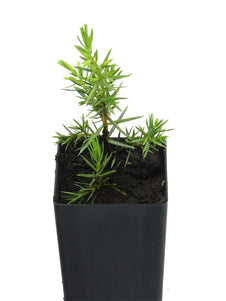
Juniper - Self Pollinating
Juniper - Self Pollinating

- In stock, ready to ship
- Inventory on the way

Usually available: All year
Life cycle: Perennial
Height: 4 - 10m
Position: Sun / part shade
Soil preference: Well drained
This is how we pack and send your Herb Plants to all states except TAS & WA
You will receive
- 1 Juniper - Self Pollinating Herb Plant in a 50 X 75mm tube - General growing instructions
All of our Herb Plants are grown organically with certified organic potting mixes and fertilizers
Botanical Name: Juniperus communis
The Common Juniper is a hardy, but slow growing coniferous shrub or tree that remains evergreen in most climates. The Self pollinating Juniper grows to 4 m high and 1.5 wide. The small needle-like leaves are blue-green, with a white stomatal line on the inner surface and held in whorls of 3. The bark is red to grey-brown in colour, quite thin and shreds easily.
The seed cones have 3-6 fused sides and are sometimes called berries or fruits. Each compartment is 4-12 mm, spherical and contains a single seed. The ripening cones, which start as green and turn to a grey-black as they start to ripen during the following season, taking some 18 months to 3 years to mature after fertilisation. When black and ripe the fruits have a leathery feel and a white ‘bloom’ or dust over them. This means Junipers may have green ‘fruits’ or cones from the current season and ripe black cones from the season before. When ripe the fruits are highly aromatic, as is the whole plant.
The scientific name for this plant is Juniperus communis and it belongs to the Cupressaceae family, which has the largest range of any woody plant. It will grow at high altitudes and as far north as Alaska, throughout Europe and into Asia. There are many subspecies and cultivars, with some being more inclined to be prostrate and others upright.
This plant is self-fertile but won't wind pollinate the female Juniper.
However, they will pollinate should the male part of the self-fertile juniper make contact with the female juniper.
Mother stock for this unique self-pollinating variety is many, many years old- originally from the former Yugoslavia.
Growing Conditions
The Common Juniper is a slow growing, hardy plant that reportedly grows as little as 2-3 cm per year. Many gardeners treat this plant as an ornamental groundcover that will eventually grow into a bigger shrub or even a tree up to 10 meters. The slow rate of growth means that the size of the plant is easily controlled to suit local conditions. It is able to grow in full sun or dappled shade and is often found in woodlands or at their edge in natural conditions. This quality enables it to grow happily in most gardens but it is said to be intolerant of full shade conditions.
Most soil types are acceptable as long as they are well drained. This includes heavy clay that does not stay damp, coastal or chalky soils and nutritionally poor soil. Dry or moist soil is tolerated and once established the Common Juniper is drought tolerant and survives in hot, sunny and dry conditions. It is very tolerant of cold conditions and is generally not bothered by frost during dormancy in European winters. A wide pH range is tolerated, from alkaline to quite acidic.
Medicinal Uses
The common Juniper has a history of medicinal and folklore application. The most significant aspect of Juniper is its potential for toxin elimination. When fully ripe the fruits and seeds are strongly antiseptic, carminative, diaphoretic, strongly diuretic, stomachic and tonic. It is used to treat cystitis and urinary problems, digestive problems, arthritis, gout, rheumatic pain, and for diabetes. External use with the essential oil or an ointment includes treatment of wounds and skin problems, where the oil may warm the skin and help to eliminate toxins and waste products from the skin and tissues. The essential oil is used in aromatherapy applications while a tea is often prepared for other treatments.
Culinary Uses
The seeds are very bitter and quite strong, so they are usually used for flavouring rather than consumed directly. They may be used raw or cooked and are harvested when dark and fully ripe. They are often crushed to release the aromatic flavour and used sparingly due to the intensity. Some examples of use include, flavouring for sauerkraut, stuffing and vegetable pates. The essential oil made from the fruit is also an essential oil for gin, the alcoholic beverage. The name ‘gin’ is derived from an Old French word for Juniper. Beers and a Finnish Ale are also flavoured by Juniper. The roasted seed may be used as a coffee substitute, while boiling the leaves and stems make a tea. A tea that tastes like the beverage gin may also be made from the fruits.
Other Uses
Traditionally the Juniper was used in epidemics with the belief that it would purify the air and cleanse it from infection. It was also used as incense, an insect repellent, to fumigate rooms and to spread around floors to sweeten the small of rooms. The wood is valued for being fragrant, dense, strong and highly ornamental. However, due to the slow growing nature of the plant there is little commercial use for the timber. Due to the decorative nature of the wood, some crafts people make bowls and containers on a small scale. A resin called Sandarac is obtained by making incisions in the trees when they are growing in hot regions. Other commercial applications include anti- dandruff shampoo and as a fragrance in spicy perfumes and the bark as cordage and tinder.
All information provided on this website is for informational purposes only. Please seek professional advice before commencing any treatment.





